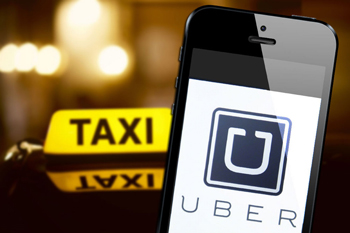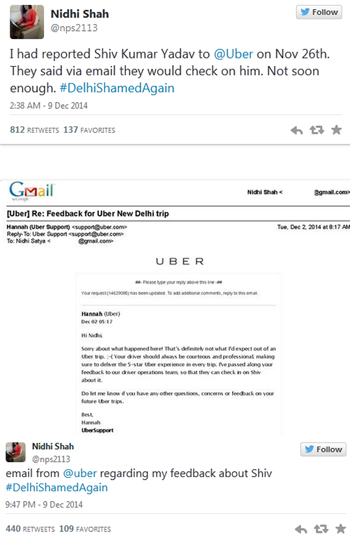 New Delhi, Dec 10: A US-based woman came forward on Tuesday saying she had filed a complaint with Uber against the driver, accused of raping a 25-year-old executive, almost a week ago. However, no action was taken by the app-based cab hailing service, she alleged.
New Delhi, Dec 10: A US-based woman came forward on Tuesday saying she had filed a complaint with Uber against the driver, accused of raping a 25-year-old executive, almost a week ago. However, no action was taken by the app-based cab hailing service, she alleged.
Shiv Kumar Yadav has been sent to police custody after the reported attack on Friday, when the woman said he raped her in his taxi, threatened to insert a metal rod inside her and ordered her not to tell authorities about the incident.
Nidhi Shah, who took Yadav's cab on November 26, first revealed her experience with Yadav on Twitter. In a series of tweets, Shah posted pictures of the taxi receipt, which had the driver's name written on it, and of her email complaint to Uber.
"I took a cab with Shiv Kumar Yadav in Delhi on November 26, scares me beyond belief," Shah tweeted.
"I had reported Him to Uber. They replied via email that they would check on him," she wrote.
"I was coming from Chandni Chowk and the driver started staring at me and giving me lecherous glances. He kept smiling at me and looking at me using the rare view mirror. The situation became so bad that I had to hide behind the seat to avoid his stares. I later filed a written complaint with Uber but no action was taken against the driver," said Shah told NDTV.
She said she received a reply from Uber saying "someone will have a chat with the driver", but there was no further follow-up.
Shah went back to the US few days after the incident but said that the laid back attitude of people encourages such perpetrators.
"I blame myself for not taking the complaint seriously. Maybe if I had insisted on stricter action, the (rape) incident could have been avoided," she told the TV channel.
Uber's head of Asia operations Allen Penn told Hindustan Times his firm is deeply sorry for the woman who was sexually assaulted and will do everything to support her family.
When asked whether they check the antecedents of the drivers, Penn said his company checks vehicles and all documents in person when a driver registers with them.
"We check drivers license, commercial vehicle registration and banking information. We get that for all the drivers. We have had frequent communication with the police and we hope justice is brought. We know the documents that are required. All payments to drivers are made electronically to their bank accounts. Banks have KYC for all account holders. We will see what else can we do. We will continue to improve."
The 32-year-old has emerged as a notorious serial sexual offender and also got bail in other cases, including one that charged him with illegal possession of a gun.
Yadav was arrested in Mainpuri in 2013 on rape charges but released on bail six months later. Delhi Police have already revealed his involvement in another previous case of rape in 2011, for which he spent seven months in Tihar jail but was let off after the case fell.
Official records show Yadav has a string of criminal complaints against him, including two molestation cases, but managed to obtain a character reference signed by a police officer that appeared to have been forged.






Comments
Add new comment